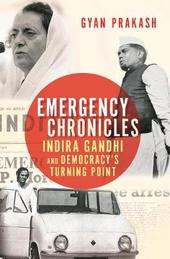
|
Emergency Chronicles: Indira Gandhi and Democracy's Turning Point
Hardback
Main Details
| Title |
Emergency Chronicles: Indira Gandhi and Democracy's Turning Point
|
| Authors and Contributors |
By (author) Gyan Prakash
|
| Physical Properties |
| Format:Hardback | | Pages:456 | | Dimensions(mm): Height 216,Width 140 |
|
| Category/Genre | Asian and Middle Eastern history |
|---|
| ISBN/Barcode |
9780691186726
|
| Classifications | Dewey:954.045092 |
|---|
| Audience | | General | | Professional & Vocational | |
|---|
| Illustrations |
30 b/w illus. 1 map.
|
|
Publishing Details |
| Publisher |
Princeton University Press
|
| Imprint |
Princeton University Press
|
| Publication Date |
26 March 2019 |
| Publication Country |
United States
|
Description
The gripping story of an explosive turning point in the history of modern India On the night of June 25, 1975, Indira Gandhi declared a state of emergency in India, suspending constitutional rights and rounding up her political opponents in midnight raids across the country. In the twenty-one harrowing months that followed, her regime unleashed
Author Biography
Gyan Prakash is the Dayton-Stockton Professor of History at Princeton University. His many books include Mumbai Fables: A History of an Enchanted City (Princeton), Bonded Histories: Genealogies of Labor Servitude in Colonial India, and Another Reason: Science and the Imagination of Modern India (Princeton). He lives in Princeton, New Jersey.
Reviews"Emergency Chronicles is perhaps the most comprehensive scholarly examination yet of the Emergency. Looking back more than four decades after Indira Gandhi stunned India and the world by suspending demo cracy, historian Gyan Prakash argues forcefully that this was no momentary distortion in India's democratic record or a nightmare that came from nowhere and vanished without a trace, leaving only its villains and heroes."---Ajoy Bose, India Today "Gyan Prakash's outstanding new book is the first historical narrative of one of the most important crises of democracy in the modern world. . . . The meticulous detail of Emergency Chronicles exposes a shameful chapter in India's democratic history."---Rana Mitter, Financial Times "[An] acute analysis of the sudden collapse of democracy in India in the mid-1970s."---Pankaj Mishra, New York Review of Books "The chronicles themselves are fluently and persuasively recounted as a narrative history of the awful excesses inflicted on individuals and communities by and during the Emergency."---Mani Shankar Aiyar, Indian Express "Gyan Prakash's excellent study . . . offers a genuinely riveting account of the decades leading up to the imposition of the emergency."---Priyamvada Gopal, Times Higher Education "Gyan Prakash's Emergency Chronicles is perhaps the first work of historical scholarship on the subject, and Prakash, who is a historian at Princeton University, has deftly dealt with the subject, not only bringing out the larger historical context, but also peppering his narrative with some good fictional work and cinema produced during the times." * Financial Express * "[Prakash] puts Emergency in perspective."---Sandeep Sinha, The Tribune "Prakash manages to tell the tale with the charm of a raconteur, and this should make it easy for generations of readers born long after 1975 to get a vivid, sepia-tinted picture of socialist India as well as the nationwide public unrest of those years."---Parsa V. Rao Jr., Gateway House "What sets [Emergency Chronicles] apart is [Prakash's] effort to take back the cause-and-effect chain right up to the debates in the Constituent Assembly where 'draconian' measures were enshrined in the constitution."---Siddharth Singh, Open Magazine "Reading Emergency Chronicles is like entering a beautiful superstructure of ideas created with lucid writing and incisive arguments with a sprinkling of historical anecdotes."---Utpal Kumar, Sunday Guardian "A valuable work."---Ben Margulies, LSE Review of Books "Prakash has written a valuable work, which embodies important lessons and certainly speaks to contemporary issues. Emergency Chronicles reminds us that the horrors of our histories do not emerge from the clear blue sky, but from long traditions of (mis)rule. The book also warns us that democracy is a game played by equals - or else a rigged game, where someone is always threatening to take the ball and go home."---Ben Margulies, Democratic Audit UK "A meticulously researched book which is likely to find a space in the book shelves of scholars and observers of Indian politics."---Ayan Guha, Democratization
|